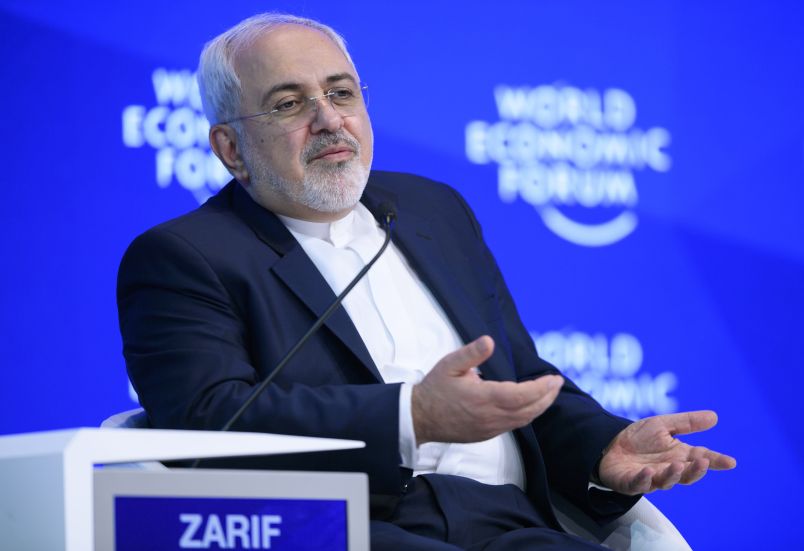Foreign Minister Mohammad Javad Zarif said he doubts Trump wants conflict because the president ran on a campaign promise “not to waste another $7 trillion in our region in order to make the situation only worse.”
But Zarif said what he called “the B team” — Bolton, Israeli Prime Minister Benjamin Netanyahu, Saudi Arabia’s Crown Prince Mohammed bin Salman and Abu Dhabi Crown Prince Mohammed bin Zayed — is trying “to push Iran to take action” as a pretext for “crazy” and “adventurous” U.S. actions.
“President Trump has a plan, but he’s being lured into not a plan but a trap,” Zarif warned in a question-and-answer session at the Asia Society. “It will cost another $7 trillion and even a greater disaster.”
Zarif said “it’s not a crisis yet, but it’s a dangerous situation,” adding that “accidents, plotted accidents are possible.”
The Trump administration re-imposed sanctions on Iran, including on its energy sector, last November, after pulling America out of the landmark 2015 nuclear deal between Iran and six world powers.
The U.S. designation of Iran’s Revolutionary Guard as a terrorist group earlier this month — the first ever for an entire division of another government — added another layer of sanctions to the powerful paramilitary force, making it a crime under U.S. jurisdiction to provide the guard with material support.
On Monday, Trump announced the U.S. will no longer exempt any countries from U.S. sanctions if they continue to buy Iranian oil, a decision that primarily affects the five remaining major importers: China and India and U.S. treaty allies Japan, South Korea, Turkey.
The move is part of the administration’s “maximum pressure” campaign on Iran that aims to eliminate all of its revenue from oil exports which the U.S. says funds destabilizing activity throughout the Mideast and beyond.
Hours before Trump’s announcement, Iran reiterated its long-running threat to close the Strait of Hormuz if it’s prevented from using the crucial waterway in the Persian Gulf through which about a third of all oil traded at sea passes. The U.S. Navy has in the past accused Iranian patrol boats of harassing American warships in the waterway.
“We believe that Iran will continue to sell its oil,” Zarif said when asked about the waivers and keeping the Strait of Hormuz open.
“We will continue to find buyers for our oil and we will continue to use the Straits of Hormuz as a safe transit passage for the sale of our oil. That is our intention and that is what we believe will happen,” he said.
“But if the United States takes the crazy measure of trying to prevent us from doing that, then it would be prepared for the consequences,” Zarif said.
What does “prevent” mean?
“The B team wants the United States to take crazy measures. And it won’t be the first time that the United States has taken adventurous measures,” Zarif replied.
The Iranian minister said he thinks Trump wants a deal “but I think he’s doing the wrong thing” by maximizing pressure, stressing that “Iranians are allergic to pressure.”
Addressing Trump, he said: “Try the language of respect. … It won’t kill you, believe me.”
Zarif said he came back to the Foreign Ministry after resigning because “we diplomats never give up hope.”
“I don’t think anybody would envy my position, particularly when I have to deal with the B team,” he said, adding to laughter, “I wish it was the A team at least.”
“I have to do whatever I can to prevent conflict, to see if we can resolve conflict peacefully, diplomatically,” Zarif said. “And I have a lot of hope.”
Zarif also commented on other world issues:
— MULTILATERALISM vs UNILATERALISM: “The rest of the world is not very happy with unilateralist policies of the United States. … We are part of the regional scenario. We are part of the global scenario.”
—REGIONAL RELATIONS: Iran has suggested a regional dialogue within the Persian Gulf that could even reach “a non-aggression pact if our neighbors are ready for a non-aggression pact with Iran. We are ready for a non-aggression pact including Saudi Arabia, including the United Arab Emirates. We have no problem.”
— IRAN’S FOREIGN RELATIONS: In the past 40 years, Iran has never had “such good relations” with Turkey and Pakistan. “We’ve never had such good relations with Azerbaijan, with Russia, with Iraq. Our relations with Afghanistan are excellent.”
— CHINA’S BELT AND ROAD INITIATIVE: “It’s a strategic initiative for China and we consider that to be positive. They’re investing a great deal in the region. They have a number of projects in Iran.” It connects the Sea of Oman to Europe and is not only for economic development “but to fight terrorism.”
—THE ISLAMIC STATE EXTREMIST GROUP ALSO KNOWN AS ISIS: “ISIS has been airlifted from Iraq and Syria into Afghanistan. You see one example of it unfortunately in the barbaric attack on Easter Sunday in Sri Lanka. But unfortunately, the people of Afghanistan are seeing incident after incident, terrorist attack after terrorist attack by ISIS … in order to create the sectarian war that ISIS has been looking for … since 2002.”
— AFGHANISTAN: “Seriously wrong policies by the United States, wrong approaches, an attempt to exclude everybody and just talk to the Taliban has alienated the government, has alienated the region, has alienated everybody else, and it achieved nothing. … You cannot negotiate the future of Afghanistan with the Taliban. The Taliban represents only a segment of Afghan society, not all of it. You cannot exclude the government, you cannot exclude the other groups in Afghanistan.”
— THE U.S. ELECTIONS IN 2020: “Believe me, we have not invested in a 2020 Democratic victory. Some people believe that we are looking for a Democratic victory. Democratic governments have been as hostile to Iran as Republican governments. … It’s just waiting for the White House to become rational, with a Republican or a Democrat.”



